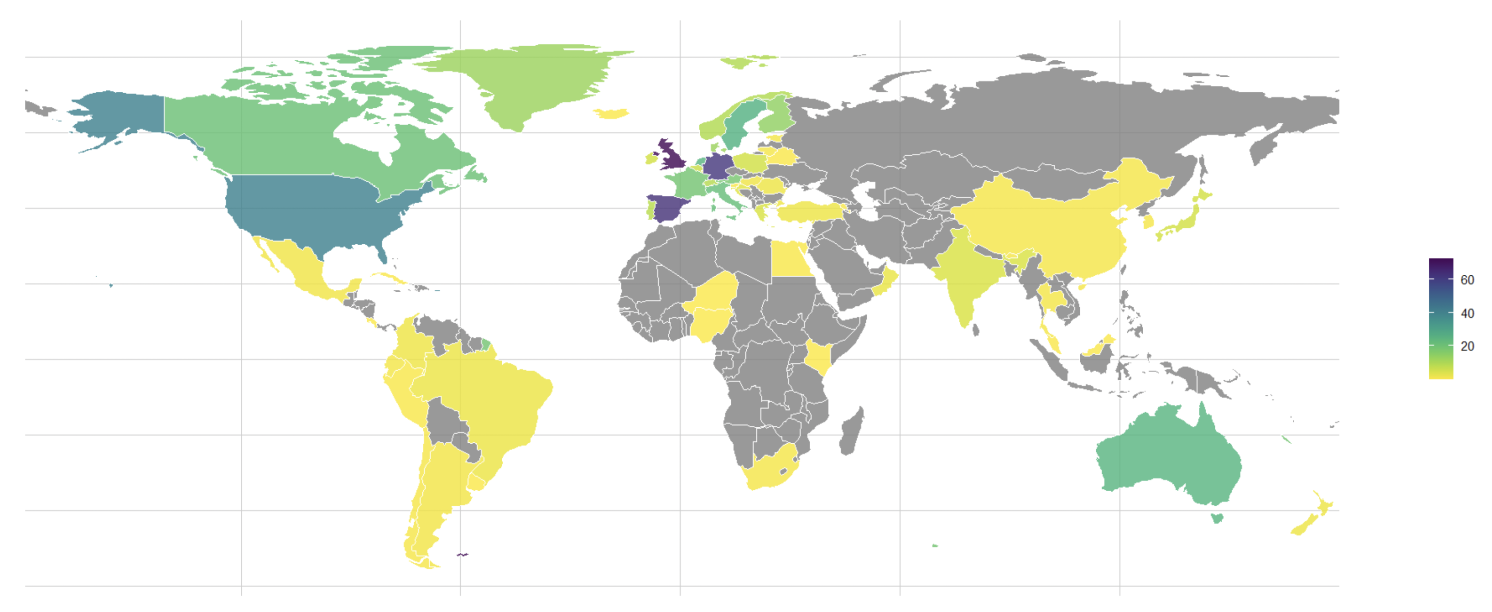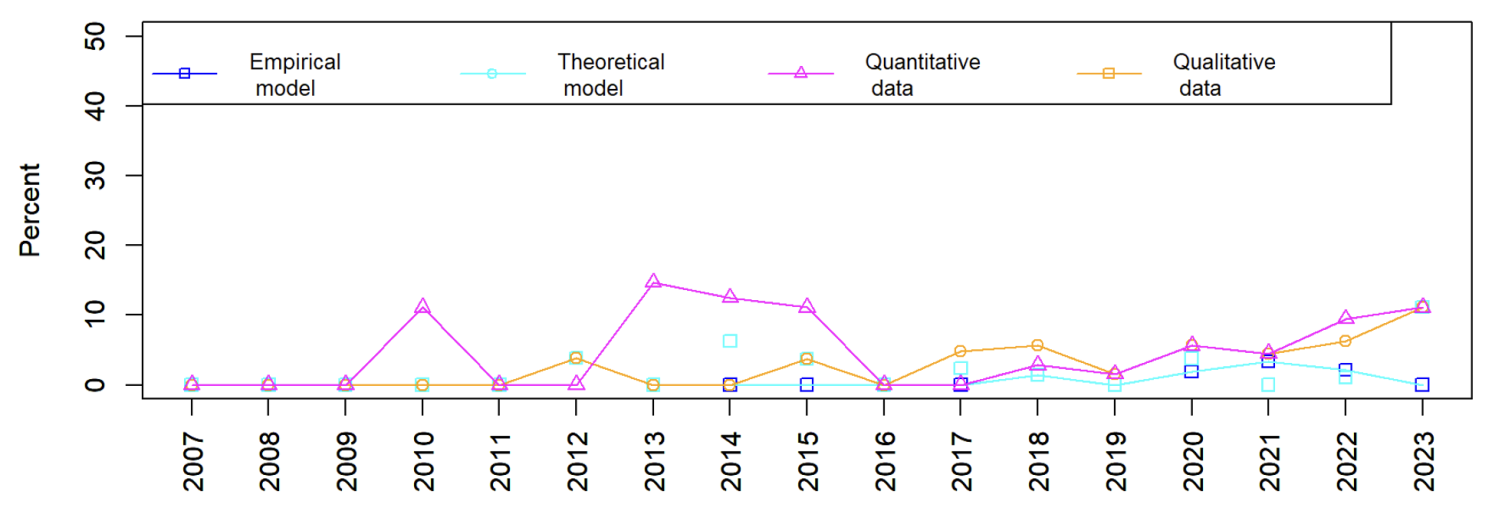That is Bare Capitalism fundraising week. 783 donors have already invested in our efforts to fight corruption and predatory conduct, significantly within the monetary realm. Please be part of us and take part by way of our donation web page, which reveals tips on how to give by way of test, bank card, debit card, PayPal, Clover, or Sensible. Examine why we’re doing this fundraiser, what we’ve achieved within the final yr, and our present purpose, karōshi prevention.
Yves right here. I think about readers will take challenge with this publish, analytically and virtually. Let’s begin out with the dearth of authority economists have to debate local weather change analyses, given their acceptance of the damaging work of William Nordhaus, appallingly legitimated by giving him a Nobel Prize. The authors are on extraordinarily skinny ice in criticizing the caliber of degrowth research in gentle of how they’ve celebrated appalling poor research that match their preferences. Steve Eager is sweet one-stop purchasing for an evisceration of his claims.
This text pointedly ignores the dearth of any options to our accelerating local weather change disaster which can be remotely ample to the dimensions of the issue. It additionally takes the place that the wants of the economic system take priority over the way forward for the biosphere and the intermediate -term survival of one thing dimly representing trendy civilization (we’re probably previous that being an achievable consequence, nevertheless it ought to at the very least be acknowledged as an goal). And it additionally implicitly ignores that absence of proof isn’t proof of absence.
By Ivan Savin and Jeroen van den Bergh. Initially revealed at VoxEU
Within the final decade, many publications have appeared on degrowth as a method to confront environmental and social issues. This column critiques their content material, information, and strategies. The authors conclude that a big majority of the research are opinions slightly than evaluation, few research use quantitative or qualitative information, and even fewer use formal modelling; the primary and second sort have a tendency to incorporate small samples or deal with non-representative circumstances; most research supply advert hoc and subjective coverage recommendation, missing coverage analysis and integration with insights from the literature on environmental/local weather insurance policies; and of the few research on public assist, a majority and essentially the most strong ones conclude that degrowth methods and insurance policies are socially and politically infeasible.
Within the final decade, quite a few research have been revealed in scientific journals that suggest the technique of ‘degrowth’, as an alternative choice to inexperienced development (Tréquer et al. 2012, Tol and Lyons 2012, Aghion 2023). The notion of degrowth refers to decreasing the dimensions of the economic system to confront environmental and social issues. Whereas having little tutorial stance (but), the subject is receiving fairly some consideration within the media and the general public sphere generally. Witness two conferences organised within the European Parliament.
To evaluate the scientific high quality of degrowth considering, we carried out a scientific literature overview of 561 revealed research utilizing the time period of their title (Savin and van den Bergh 2024). This allowed us to find out the share of research providing conceptual dialogue and subjective opinions versus information evaluation or quantitative modelling. As well as, we examined if research addressed local weather/environmental coverage, together with coverage assist/feasibility, and whether or not this was effectively embedded within the broader literature on this.
Distribution of Research Over Time, International locations, and Presence of Scientific Strategies
Determine 1 reveals a rising variety of research on degrowth over time. As indicated by the pink line, ten years in the past just about all research on this vein explicitly talked about the time period “degrowth” of their title, whereas extra just lately many use the vaguer time period “postgrowth” as an alternative, presumably to scale back resistance.
The massive majority (virtually 90%) of research are opinions slightly than evaluation. Solely 9 research (1.6% of the pattern) use a theoretical mannequin, eight (1.4%) employed an empirical mannequin, 31 (5.5%) carried out quantitative information evaluation, and one other 23 research (4.1%) qualitative information evaluation (e.g. interviews). As Determine 3 reveals, there isn’t any clear pattern indicating that the share of research with a concrete technique is growing.
Determine 1 Time distribution of educational publications on degrowth
Observe: The histogram depicts the frequency of research by yr whereas the pink line signifies the variety of research that used “degrowth” (versus post-growth) of their title.
Most authors within the pattern are affiliated with institutes in Western Europe and the US (Determine 2), with the UK, Spain, and Germany main by a big margin. That is consistent with earlier analysis discovering that there’s little assist for degrowth within the International South (King et al. 2023).
Determine 2 Geographical frequency of writer affiliations

Determine 3 The time sample of the share of research utilizing one of many 4 strategies

Deal with Small Samples and Lack of Systemic Perspective on the Financial system
Inspecting the 54 research that used qualitative or quantitative information evaluation, we discover that they have an inclination to incorporate small samples or deal with peculiar circumstances – for instance, ten interviews with 11 respondents on the subject of native development discourses within the small city of Alingsås, Sweden (Buhr et al. 2018), or two places of ‘rural-urban (rurban) squatting’ within the Barcelona hills of Collserola (Cattaneo and Gavaldà 2010). This simply offers rise to non-representative and even biased insights. This weak spot of empirical analysis on degrowth is comprehensible to some extent. The concept of degrowth is so removed from actuality and has seen no severe implementation, which makes good empirical research a difficult activity. Previous experiences as in communist nations (e.g. Cuba), low-growth nations (e.g. Japan), or financial decline because of COVID-19 don’t function convincing examples of degrowth. Arguably one of the best one can obtain is stated-preference analysis and behavioural experiments. Whereas this could then be executed for sufficiently massive samples, this ambition tends to be missing in research on degrowth. The few research that do use bigger information units are inclined to not accumulate these themselves however depend on information of a common nature, such because the European Worth Research (Paulson and Büchs 2022). The issue is that these don’t explicitly inquire about degrowth however pose slightly common questions on development versus setting that are open to interpretation (Drews et al. 2018). In consequence, the related research arrive at overly optimistic conclusions about assist for degrowth (Paulson and Büchs 2022). That is confirmed by a number of strong research by psychologists which discover that the majority individuals in experiments are inclined to emotionally react negatively to a message of advocating radical degrowth, whereas many understand degrowth methods as a risk. As well as, earlier surveys which attempt to clearly separate the distinct positions on development versus setting (like by Drews et al. 2019) discover extra assist for ‘agrowth’, i.e. being agnostic about or ignoring GDP (van den Bergh, 2011), than degrowth amongst tutorial researchers broadly in addition to most people.
Since degrowth methods are usually radical, i.e. they suggest main modifications in socioeconomic programs, it’s essential to have good perception into their systemic and macroeconomic penalties. However sadly, many research suggest to undertake a big socioeconomic experiment with massive socioeconomic dangers with out having perception into the larger image. Most quantitative and qualitative research deal with small and native points, often with non-representative and really small samples – making it inconceivable to attract conclusions in regards to the systemic impacts. Out of the 561 research we reviewed, solely 17 research utilizing theoretical or empirical modelling shed some gentle on these broader penalties. A number of of them draw slightly pessimistic conclusions on this regard. For instance, Hardt et al. (2020) discover {that a} shift in direction of labour-intensive service sectors – a part of many degrowth proposals – would end in small reductions in general vitality use due to their oblique vitality use. And Malmaeus et al. (2020) conclude that common primary earnings, a preferred theme in degrowth writings, is much less appropriate with a neighborhood, labour-intensive and self-sufficient economic system than with a worldwide, capital-intensive and high-tech economic system.
It’s worthwhile noting that a number of analysis that goes beneath the label of ‘degrowth’ isn’t authentic however comes all the way down to relabelling present analysis, equivalent to on worktime discount, round economic system, refurbishing homes, or the bioeconomy. That is ironic given the plea for ‘decolonising’ within the degrowth neighborhood (Deschner and Hurst 2018).
Why So Many Unhealthy Research and the Want for Self-Criticism?
One might surprise how it’s attainable that so many degrowth research of inferior high quality bought revealed. One clarification is that round 100 articles in our pattern had been revealed in particular points (14 in complete) whereas one other 18 had been revealed by the Multidisciplinary Digital Publishing Institute (MDPI), which has been accused of being a predatory writer (Ángeles Oviedo-García 2021). One other attainable clarification is that many reviewers are chosen based mostly on their sympathy for degrowth (indicated by previous publications selling it) as an alternative of proven experience concerning software of strategies. Altogether, the journal overview course of to guage papers was probably extra lenient for a lot of degrowth research than for the typical tutorial article. As a consequence, revealed analysis on degrowth is dominated by ideology whereas missing scientific high quality.
By way of drawing consideration to a number of weaknesses in the best way analysis on degrowth is undertaken, our overview suggests the necessity for a wholesome diploma of self-criticism and modesty within the degrowth neighborhood. The analysis ought to grow to be extra bold by way of case research choice to guarantee that local- or region-scale research are complementary and consultant. In flip, this can permit for generalisation or upscaling of findings to reach at a reputable international image. To additional contribute to this purpose, additionally extra research are wanted of a systemic nature – to evaluate the relative position of scale versus substitution and effectivity in addition to to find out oblique financial, social, and environmental results, notably vitality/carbon rebound. Subsequent, for degrowth analysis to be taken extra significantly, it’s important that it units greater requirements for measurement and representativeness of samples in empirical research, investigates public and stakeholder assist of degrowth considering, and strives for synergy with present analysis fields (e.g. economics, psychology, coverage research) as these supply a wealth of insights about designing efficient, environment friendly, and equitable environmental/local weather coverage that may rely on ample public assist.
See authentic publish for references

